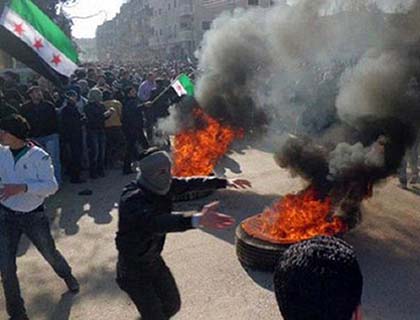Seemingly, the army defectors and protestors who have held arms are increasingly changing to existential threat to government. The first senior political defector, Mr. Nawaf Fares has said that the days of President Assad's were numbered while expressing his concern about possible use of chemical weapons by the regime. Crackling sounds are now irritating Damascus residents who, long after the breakout of civil uprising, remained calm.
Even a year after the civil uprising, I asked a friend who went to Damascus as pilgrimage; he said that the capital was calm as if nothing wrong was going on across the country. Just within few months, the capital which was considered impenetrable stronghold of the regime is an eyewitness to visible resistance of rebellions.
Now they are not trying to take control of particular district or state like Libyan rebellions that could finally succeed to topple Moammar Gaddafi's regime. They were forced out from Benghazi and changed it into their stronghold in which they succeeded, because the differences within the international community were not so sharp and finally resolution passed to support rebellions. Ostensibly, duplicate of the policy was applied in Homes which instead followed drastic rout of armed oppositions by regime's armored vehicles and security forces.
The Homes city which was hoped to change into another Benghazi razed down by strong Syrian security forces. So, the ordeal of Homes was lessened. Even in the capital, rebellions have spread across to remain unnoticed while carrying sporadic attacks against security forces and their strong headquarters which proved deadly for Damascus.
Moreover, on Wednesday a suicide bombing took place in national Security Council center which killed the Defense Minister, Mr. Dawood Rahja, and Brother In-law to President Assad. His death is indeed terrible to regime which now faces critical problem in restoration of peace and stability.
Meanwhile, efforts are made to ban an all-out civil war. The former Secretary General of the United Nations, Mr. Koffi Annan travelled early this week to Moscow to hold talks with President Putin in order to convince him to let pressure mount against the regime. However, it is hard that Moscow yields to Western pressure and gives up support to Russia's close ally in the region, but President Putin emphasized that he supported Annan's peace plan brokered in April 12, which has not been put in practice by both sides.
Rather the violence has spiraled up to worrying peak. It is alleged that more than 17,000 people have been killed since the start of civil uprising last year.
When the uprising started more than a year and half ago, it got the global attention. However, demonstrators attracted huge sympathy but the international community has been divided sharply. Thus,
The situation became gruesomely dangerous when the international community failed to take a joint front against Damascus. Drafts prepared mostly European countries for tougher action two times were vetoed in the United Nations Security Council by China and Russia which feared about the consequences.
Possibly, within coming days or week, another resolution will be put aimed to ratchet up pressure against Damascus in order to end the present deadly attacks, but there is not much hope in it. It is possible that this upcoming one also encounters the destiny of former ones. China and Russia would once again prefer to avoid foreign military intervention. Meanwhile, it is hardly possible that include anything like that of Libyan-like no fly zone. Because comparing Libya with Syria is a blunt mistake.
The regime of President Assad is far powerful and also interconnected with countries like Iran and groups like Hezbollah. Thus, considering the challenges, it is far likely for anti-Assad countries to start a war against Damascus. In another word, the United States is engaged in a corrosive war against Taliban-led militants in Afghanistan and just pulled out of Iraq; clearly, it does not have the will to start another war in such crisis ridden region. Without the US, it is far likely that its European allies embark to such financially and humanitarianly costly war.
The regional rivalry among countries is also something that cannot be neglected and made the situation further complex. Tehran has been supporting President since the very start of civil uprising. The supreme leader who is the ultimate decision maker in the country, Mr. Ayatollah Ali Khamenae often openly voiced out support for Damascus regime while condemning other regimes reacted similarly in the case of uprising breakout. While insisting that Arab countries are affected by more than 30-years old Islamic revolution in Iran, he links civil unrest in Syria to foreign intervention. Therefore, the so-called proxy war and the dominant presence of Allawites, a minor who can hardly be branded as part of Shiite group, have further complicated the situation.
Within such regional global adversaries and differences, there is no hope tha the security situation gets right away back. During past months, it is clearly perceptible that President Bashar Al-Assad is not the type of man to step down due to global demand or civil pressure. He may resist till end knows losing power also would mean his end of his life also. It is clear that rebellions may not yield in lesser than his death after possible forcing him down. He is blamed for deaths of more than 17,000 people!
On other hand, rebellions have joined hands with radical groups. They are going to lay down arms without toppling the regime. Whether the earlier demonstrators want or not, army defectors, radical groups, and those who ultimately reach to conclusion that arms the only solution ahead want to continue their armed struggle. The result is what we see nowadays: violence and bloodsheds.

